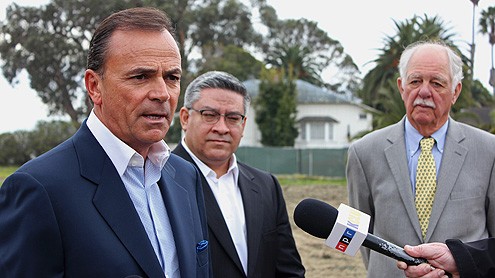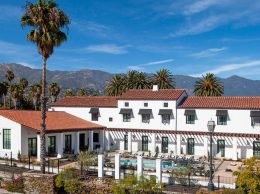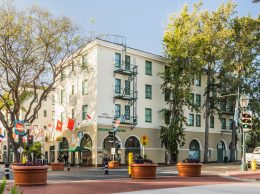Caruso, county resume talks over Miramar wages

From left: Los Angeles developer Rick Caruso, Santa Barbara County Supervisor Salud Carbajal and Montecito Association President Richard Nordlund at a press conference at the Miramar hotel project in Montecito. (Alex Kacik photo)
Los Angeles developer Rick Caruso said Jan. 23 that he has resumed talks with Santa Barbara County officials to implement a hotel incentive program to kickstart work on the Miramar Hotel.
First District Supervisor Salud Carbajal and Montecito Association President Richard Nordlund joined Caruso at the recently demolished Miramar site in Montecito to discuss the project’s next steps.
Caruso’s firm initially asked the county for a 15-year bed tax rebate for its estimated $170 million project. The Board of Supervisors approved the so-called Hotel Incentive Program in June, which means that that 70 percent of the county’s bed-tax revenues from large new projects will be used for an incentive program, 20 percent for general county programs and 10 percent for tourism promotion.
County staff estimated that the Miramar would bring in $1.7 million in property tax, $1.5 million in sales tax and $450,000 in bed taxes when the new 186-room hotel is completed. The 70-20-10 split would provide a $21 million incentive to the developers, staff estimated at the Board of Supervisors meeting in June.
Caruso said that negotiations to finalize an agreement were going well until things “broke apart” over a prevailing wage clause in the implementation agreement. When private developers take government money for a project, whether in the form of cash or a tax break, they are generally required to pay the same higher wages that governments must pay for construction labor.
“The overarching issue is that we need a commitment that the reimbursement of the TOT comes back to us if we make the investment, particularly since the investment becomes greater due to prevailing wage,” he said. “So in order to get the TOT reimbursement we have to agree to prevailing wage, which is a higher wage that we agree to pay the workers on the property, which is fine. If we make that investment, we want to make sure we get an [annual] reimbursement.”
If Caruso and the county reach an agreement, Caruso plans to search for financing this year, break ground next year and build the beachfront hotel in 2016. But the project will be “delayed” if the agreement falls apart, Caruso said.
“And the real issue right now is that the lending community, although it’s much better and certainly on apartments and retail, is still a little bit more complicated for a hotel,” he said. “A hotel is not as in favor, so with these extra incentives it would give us a big boost and move the project along that much quicker.”
As of now, the county collects $568,000 a year in property taxes on the site. It would collect about $10 million after 20 years if the Miramar stays as is. If Caruso builds the project, the county would collect the increased property tax, the sales tax and 70 percent of the transient occupancy tax, or $130 million after 20 years.
Carbajal and Caruso are optimistic that they will reach an agreement and the hotel will be built. “This is a legal issue that we haven’t been able to get over, our lawyers and Mr. Caruso’s lawyers,” Carbajal said. “I remain optimistic that we may be able to find a way to address that issue.”












